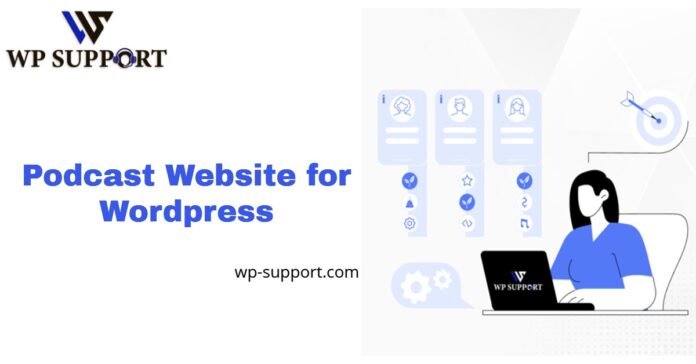
Creating a blog and podcast website focused on WordPress can be a great way to share knowledge, tips, and insights with the WordPress community. Here’s a guide to help you set up your WordPress website for blogging and podcasting:
- Choose a Domain Name: Select a domain name that reflects your website’s focus on WordPress. Consider something like “wp-support.com“.
- Set Up Hosting: Choose a reliable hosting provider that offers WordPress hosting. Popular options include Managed WordPress Hosting, Bluehost, SiteGround, and WP Engine. Install WordPress on your hosting account.
- Select a WordPress Theme: Choose a WordPress theme that suits your website’s style and functionality needs. Look for themes that are responsive, customizable, and optimized for SEO. Some themes also offer built-in podcasting support.
- Install Essential Plugins:
- Yoast SEO: Optimize your content for search engines.
- Seriously Simple Podcasting: Manage and publish podcast episodes.
- Jetpack: Enhance your website’s security, performance, and social sharing capabilities.
- Contact Form 7: Create customizable contact forms.
- UpdraftPlus: Backup your WordPress website regularly.
- Create Content Categories: Determine the main topics or categories you’ll cover on your blog and podcast. This could include WordPress tutorials, plugin reviews, theme recommendations, troubleshooting tips, and industry news.
- Start Blogging: Begin creating blog posts related to WordPress. Write informative articles, tutorials, guides, and opinion pieces that provide value to your audience. Make sure your content is well-researched, engaging, and optimized for SEO.
- Launch Your Podcast: If you’re including podcasts on your website, start recording and publishing episodes. Share your expertise, interview other WordPress experts, and provide insights into WordPress-related topics. Use podcasting platforms like Anchor or Libsyn to host your audio files.
- Promote Your Content: Use social media, email newsletters, and other marketing channels to promote your blog posts and podcast episodes. Engage with your audience, respond to comments, and encourage sharing to increase visibility.
- Monitor Performance: Keep track of your website’s performance using tools like Google Analytics. Analyze metrics such as traffic, user engagement, and conversion rates to identify areas for improvement and refine your content strategy.
- Stay Consistent: Consistency is key to building a successful blog and podcast. Stick to a regular publishing schedule and continue producing high-quality content that resonates with your audience.
By adhering to these guidelines, you can develop an invaluable hub for the WordPress community, positioning your website as a primary source for insightful content and dependable support on all things WordPress. Should you encounter any challenges with your WordPress website, WP Support stands ready to assist you. Their expertise can be a tremendous asset in overcoming any obstacles you may face.

